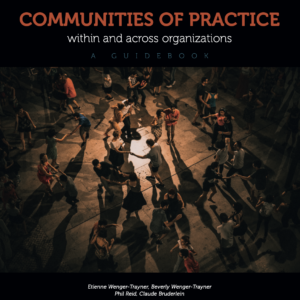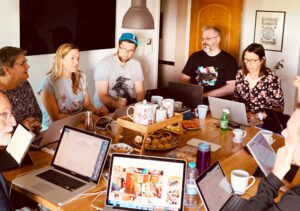NOTICE: There is an updated version of all these FAQs on our new website:
What about tasks and expectations for communities of practice?
Communities of practice that have high expectations about what they can achieve tend to be energized. And yet misplaced tasks and expectations can also make the community feel like just another job to do. So the question tasks and expectations hinges on a key distinction between energizing and de-energizing tasks and expectations:
Energizing tasks and expectations. They usually allow practitioners to make a difference with their expertise; they help them connect with each other around their desire to perfect their craft; they have visibility in the organization (or at least with the people who can appreciate the results). Typical examples include solving hard problems, debating a hot issue, or inspecting a competitor’s products.
De-energizing tasks and expectations. They feel like an imposition and make community participation seem like work as usual; they do not entail much learning; and they do not reflect the real value of the community. Typical examples include collecting data, logistics, writing, or answering the same basic questions over and over.
Obviously, this distinction is a subjective matter and the same task or expectation can have either effect depending on the circumstances. Still, we have found the distinction useful because it seems to matter much more than where the task or expectation originated. The critical issue is not whether a given challenge was initially self-generated or suggested from the outside. A technical question from the CEO can be energizing; and a member’s suggestion to review the literature de-energizing. The critical issue is energy. The source of energy in community participation can be an instrumental benefit such as saving time, but just as often, it is learning, excitement, and professionalism. A hallmark of a mature professional identity is a desire to make a difference.
Communities of practice can be propelled forward by energizing tasks and expectations; they can be killed by de-energizing ones. We have seen it happen. Communities of practice can be viewed as a convenient resource to perform tasks for which there is no funding. No matter how much you care about a domain of knowledge, if participation in your community inevitably results in hours of undesirable homework, you’ll want to stay away. If an organization is going to ask communities of practice to perform tasks that are not energizing, but for which they are uniquely qualified, then it needs to fund these tasks explicitly and offer logistical support.
| << Should participation be voluntary? | What about power in organizations? >> |
For more information, click here:
For a more precise definition, see our theory page on communities of practice:
For a bit more info, see our general (but brief) introduction to communities of practice and their use in various contexts:
For practical advice on cultivating communities of practice, see our new guidebook:
For workshops on cultivating communities of practice:



I am working on a course assignment that required me to visit a CoP, and I found the introduction on the “communities of practice” rather informative. I came across this entry and I like the explanation of energizing and de-energizing tasks and expectations in a community of practice; it is definitely usefule information to share with my department as we move in to the new year . Thanks!
Thanks for passing by to give some feedback, Jacquie.